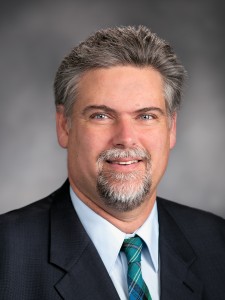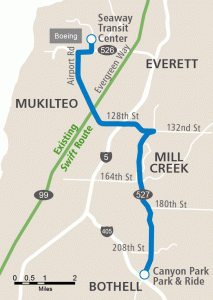On Monday, the House Transportation Committee voted to expand Community Transit’s revenue authority to help restore deep service cuts and fund an expansion of the popular bus rapid transit line known as Swift II (vote breakdown below). The 0.3% sales tax increase will bring the first opportunity in 13 years for the transit agency to expand its revenue generating capacity.
Swift II represents a 12.5-mile expansion of bus rapid transit, running from Boeing’s Paine Field down to Bothell at the Snohomish-King County line. The new route is predicted to generate 3,300 riders on opening day, expanding on the resounding success of its predecessor Swift I, which carries as many as 1-in-6 weekday riders and 1-in-3 Saturday riders for the agency.
As Snohomish County’s primary transit agency, Community Transit has struggled to recover from deep recession-era cuts. Testifying during the bill’s hearing on Thursday, Mike Todd, the Board Chair of the agency, said increased revenue from the recovering economy would only restore 45% of service hours. But many of these hours will be used to simply maintain service as worsening congestion brings busses to a crawl. Commute times from Everett and Seattle have increased over 30% since 2010, peaking at well over 100 minutes.
Support for the legislation was strong at the public hearing with no opposition present. Andrew Austin, policy director at Seattle-based Transportation Choices Coalition, testified about the importance of restoring Sunday and late-night service to seniors, church-goers, and swing-shift workers across the County. Austin Wright-Pettibone, a student lobbyist from UW, shared the importance of transit to students, with 85% of students from UW using transit and 25% reporting public transit as their sole means of transportation. Everett Community College, the educational backbone of Snohomish County, has expanded rapidly in recent years, with WSU announcing a $10 million expansion to the campus in 2013.

In stark contrast to last week’s vote on Sound Transit 3 (ST3), this vote was widely bipartisan with only two votes in opposition. Rep. Orcutt (R-20, Clark County), the ranking Republican on the committee, stepped “outside of [his] comfort zone” in voting for the bill. Though he mulled concerns about granting local jurisdictions greater revenue authority, he ultimately praised the bill for requiring a vote of the people and for being an example of transit coming from local government.
Perhaps most striking about his comments were the ways they mirrored his arguments against ST3 last week. Indeed, both bills require voter approval, grant revenue authority on the local level, and represent local governments supporting transit. There appears to be no articulable reason why Rep. Orcutt, and eight of his Republican colleagues, would change their minds to vote for this bill (HB 1393).
The bill will likely be heard next by the House Finance Committee, chaired by Reuven Carlyle (D-36, Seattle), where it is expected to pass. It will then face a vote on the House floor before facing the Republican-controlled Senate.
Vote Breakdown
| MEMBER | PARTY | VOTE | DISTRICT |
| Judy Clibborn | D | Aye | 41 |
| Jessyn Farrell | D | Aye | 46 |
| Jake Fey | D | Aye | 27 |
| Luis Moscoso | D | Aye | 1 |
| Ed Orcutt | R | Aye | 20 |
| Mark Hargrove | R | Aye | 47 |
| Steve Bergquist | D | Aye | 11 |
| Mia Gregerson | D | Aye | 33 |
| Mark Harmsworth | R | Aye | 44 |
| Dave Hayes | R | Aye | 10 |
| Linda Kochmar | R | Aye | 30 |
| Joan McBride | D | Aye | 48 |
| Jim Moeller | D | Aye | 49 |
| Jeff Morris | D | Aye | 40 |
| Lillian Ortiz-Self | D | Aye | 21 |
| Liz Pike | R | Aye | 18 |
| Marcus Riccelli | D | Aye | 3 |
| Jay Rodne | R | Excused | 5 |
| Mike Sells | D | Aye | 38 |
| Matt Shea | R | Nay | 4 |
| Dean Takko | D | Aye | 19 |
| Gael Tarleton | D | Aye | 36 |
| Lynda Wilson | R | Aye | 17 |
| Jesse Young | R | Nay | 26 |
| Hans Zeiger | R | Aye | 25 |

Ben Crowther
Ben is a Seattle area native, living with his husband downtown since 2013. He started in queer grassroots organizing in 2009 and quickly developed a love for all things political and wonky. When he’s not reading news articles, he can be found excitedly pointing out new buses or prime plots for redevelopment to his uninterested friends who really just want to get to dinner. Ben served as The Urbanist's Policy and Legislative Affairs Director from 2015 to 2018 and primarily writes about political issues.


